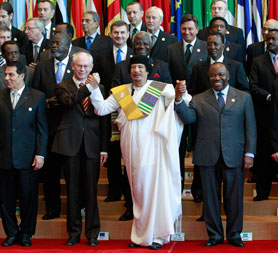Africans appear to have upper hand at Africa-EU summit
With the third Africa-EU finished, it looks like Africa have the upper hand, writes independent journalist and East Africa expert Jamal Osman for Channel 4 News.

After decades of imbalance between the two blocs, the African leaders have used scaremongering tactics to threaten the EU on various fronts – including trade, immigration and terrorism.
The 27-nation EU and the 53 African nations held the summit in the Libyan capital Tripoli at the beginning of the week with security, immigration and development on the agenda.
Africa is increasingly seen as a continent of opportunity, rather than of humanitarian disasters. And its leaders warned that should the former colonies fail to listen, Africa would take its business elsewhere.
China, Brazil, Russia and India are striking ever more far-reaching deals with the continent for trade in minerals and energy.
Opening the summit on Monday, Libyan leader Muammar Gaddafi said: “We have failed in our economic partnership with Europe.
“We want win-win relations based on mutual interest and not on exploitation.
“Europe talks to us of governance, human rights. We focused on politics and left aside the economy. Africa needs economics, not politics. Africa and Europe need each other.”
With GDP growth of as much as 10 per cent in some African countries, the prospect of a growing consumer base, among the one-billion-strong population, is of great interest to leading and emerging economic powers.
Immigration has been high on the political agenda in many EU countries. Rightwing populist parties are on the march across Europe, reshaping the continent’s politics by exploiting the subject of immigration.
In the Netherlands, the minority government depends for its survival on the support of Geert Wilders, a politician facing trial on charges of inciting hatred against Muslims. In Sweden, an anti-immigrant party won seats in parliament for the first time. In Austria, a far-right party has doubled its vote, raising the prospect of its return to power.
If these parties make more progress, it may prove difficult for governments to contain the damage that risks being inflicted on Europe’s image and interests in the wider world. For African leaders, there’s no better time to capitalise on the controversy surrounding immigration. That being the case, Gaddafi demanded five billion Euros from the EU to control illegal migration into Europe or face becoming “black.”
With the biggest security threat in Europe arguably coming from Islamist radicals, many of the right-wing parties campaign against what they call the “Islamisation” of Europe. In similar fashion, some African leaders are jumping on the “war on terror” bandwagon and demanding more money from the EU to fight the spread of Islamists in the continent.
Their argument runs – “We contain them in Africa or let them go to Europe to cause havoc”. In east Africa, for instance, the growth of Al Shabab, an al-Qaeda-linked Islamist group fighting to topple a weak transitional government in Somalia, is giving headache to European security services. They fear that the organisation, which is believed to have influence in Europe, may train EU nationals and send them back home to act when needed. More so, al-Qaeda in the Islamic Maghreb (AQIM) is stretching its reach in north Africa. And, in Europe, there are large communities from that part of Africa, which is a cause for concern.
Even though, EU remains Africa’s leading aid and trading partner, observers say it risks being pushed aside by emerging economic powers such as Brazil, China and India, all chasing the spoils of the resource-rich continent. On the human rights front, activists are concerned that while in the past, EU would have threatened uncooperative-African leaders with sanction, now they have to emulate China and turn a blind eye to the internal affairs in order to work with the African governments on trade, security and immigration.




